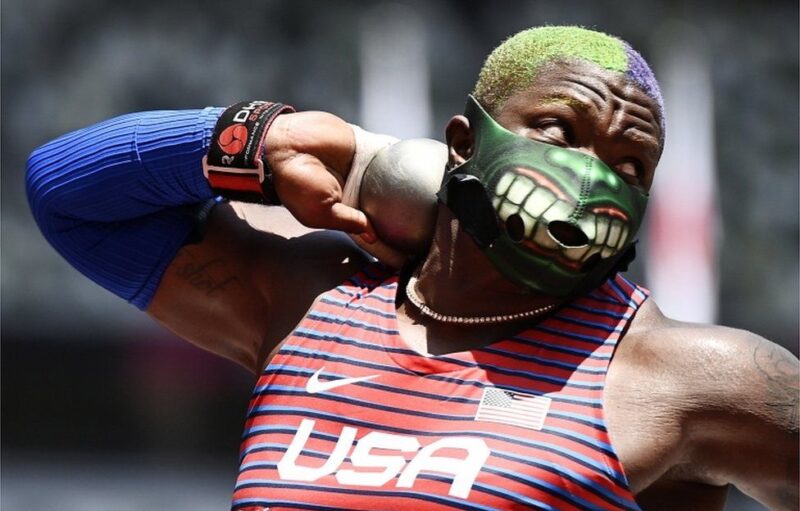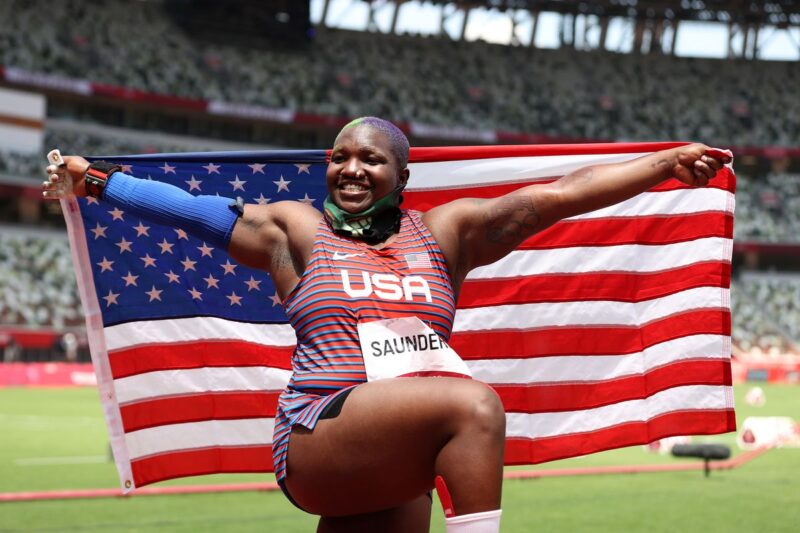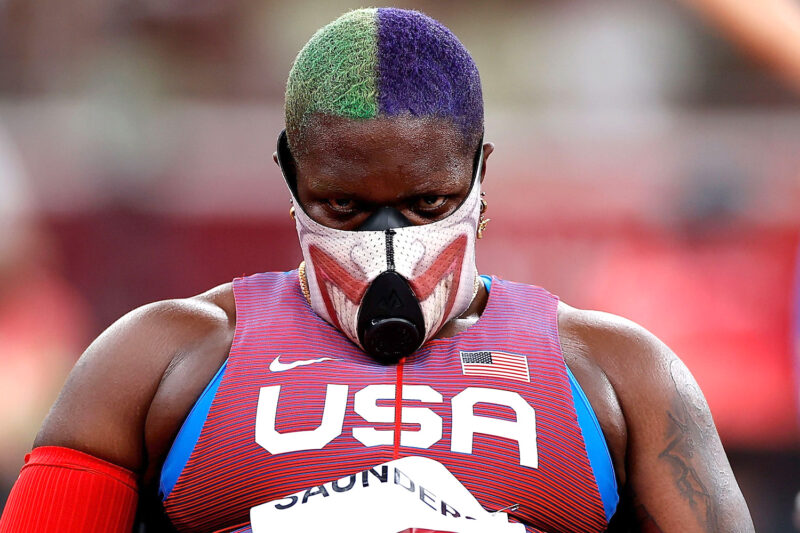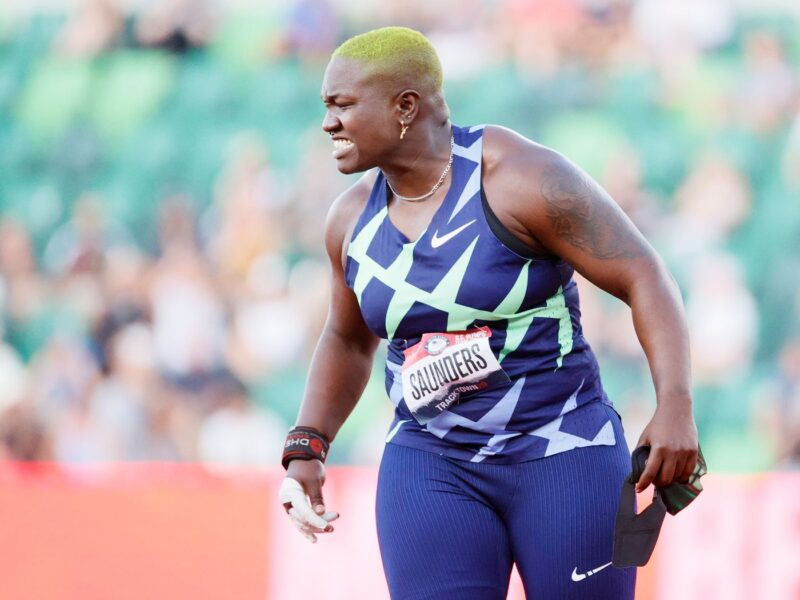Raven Saunders is a shot putter and mental health advocate who has been on the forefront of advocating for change in Japan, where she was born and raised. She’s also taken a stand against the pandemic of mental illness in her country and helped to create a new program that will help people with depression.
After earning Olympic shot put silver on August 1, Raven Saunders drew an X on the podium.
Raven Saunders wanted to make a strong statement when standing on the podium in Tokyo with an Olympic silver medal around her neck.
She knew who she wanted to stand out for and had discussed it with her friends and family, but she didn’t know how. As a result, she needed to think fast.
From her home in the United States, the shot putter, 25, tells Sport, “It was in the moment I chose.”
“We had previously discussed what our presentation would be, and it seemed to suit well.”
Saunders created an X sign with her arms crossed over her head, which was visible all around the globe.
“It’s the crossroads of all persecuted groups,” she explains.
“It just seemed appropriate for me since I’m a black, lesbian woman who works in mental health and knows so many individuals with impairments.”
“I’ve always been one to speak out for people who haven’t had their voices heard. And if I’d seen someone who looked like me when I was younger, it would have given me a lot more confidence to be myself.”
‘I’d developed a reputation for being psychologically strong.’

At Tokyo 2023, Saunders fought in a variety of face masks, including one based on The Hulk for her final.
A short glance at Saunders’ TikTok account reveals that she enjoys having fun, with over 150,000 followers and growing.
“I wanted to be the center of attention while I was at the Olympic village,” Saunders recalls.
“Ask anybody from virtually any nation about the crazy lady with the split hair and the speaker who went around the whole hamlet, dancing and banging music.”
“I was simply trying to get everyone engaged in the dining hall, the weight room, the street, and on the bus. It was a lot of fun, and I was like, “This is why I’m here!””
Saunders’ writings on mental health are just as popular, but getting to the point where she felt ready to share her difficulties wasn’t simple.
And the shot-putter confesses that her athletic achievement complicated matters.
“I was giving so much of myself because I felt like I owed it to everyone around me,” she recalls. “I felt like I owed it to my coaches, my teammates, and my parents.” But I got caught up in it, and I forgot about what I owed myself.
“I fought myself before I opened out. The uncertainty of what others may or may not think made me feel ashamed and afraid.
“I’d developed a character of being so strong and psychologically robust that I can take and manage anything and be unaffected by it.”
“That was my perception of myself and how I presented myself to the world.” So moving from that to ‘Well, I have these issues’ made me feel very exposed for two or three days.
“I nearly went back, but hearing people’s encouraging comments and how they could connect to that… I consider myself fortunate to have had such a positive response.”
‘When I return the following day, the entire school knows.’

Saunders’ desire to be honest also extends to discussing her sexuality and the painful manner she was forced to come out to her classmates in Charleston, South Carolina, while she was still in elementary school.
She recalls, “When I was in fifth school, I had the greatest infatuation on this girl.”
“I reworked a Justin Timberlake song about her and changed the lyrics to include her name.” ‘Hey, keep an eye on my diary,’ I urged my best buddy as I had to leave early for a dental appointment. Please don’t come near my desk.’
“When I return the following day, the whole school knows.”
“I had to deal with that for the remainder of the school year – and then when I went to middle school [for kids aged 11 to 13], I was re-outed, and that’s when people began treating me strangely there.”
“It was a strange, terrible event, but nothing compared to what some of the community members go through.”
‘I felt like my message had a potential to make an impact.’

At Tokyo 2023, Saunders won silver in the shot put.
Saunders now has some free time after undergoing post-Olympics surgery for an ailment.
As a consequence, she’s been able to post more of the viral social media videos from Tokyo 2023, such as her advise on what foods to avoid in the players’ dining hall and her perplexed first encounter with a bidet.
She chuckles and says, “I’ve been TikToking.”
“Because that’s the sort of stuff I create, I prefer things that are relevant. So anything amusing makes me think, ‘OK, I appreciate what you did there.’ ‘That’s a hoot!’”
However, the loneliness the American felt while dealing with her mental health and sexuality indicates that there is also material to assist others who are suffering in their own lives.
And, in the age of Covid, Saunders thinks it’s even more critical for athletes to demonstrate that it’s OK to be bad.
“Everyone’s mental health is totally screwed up after a global epidemic,” she adds.
“Whether you’re green, black, purple, Asian, Hispanic, or Latina, you’ve dealt with something.”
“I felt like my message had a potential to reach so many different individuals, and it was something that needed to be spoken,” she says.
Raven Saunders was interviewed by for the LGBT Sport Podcast. Sounds broadcasts new episodes every Wednesday.

 After earning Olympic shot put silver on August 1, Raven Saunders drew an X on the podium.
After earning Olympic shot put silver on August 1, Raven Saunders drew an X on the podium.
